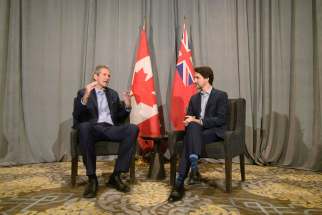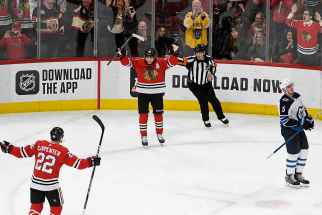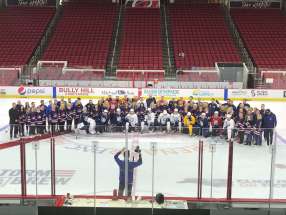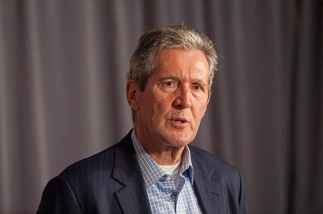IOC edict bans protest, chance to promote real change
Read this article for free:
or
Already have an account? Log in here »
To continue reading, please subscribe:
Monthly Digital Subscription
$1 per week for 24 weeks*
- Enjoy unlimited reading on winnipegfreepress.com
- Read the E-Edition, our digital replica newspaper
- Access News Break, our award-winning app
- Play interactive puzzles
*Billed as $4 plus GST every four weeks. Offer only available to new and qualified returning subscribers. Cancel any time.
Read unlimited articles for free today:
or
Already have an account? Log in here »
Hey there, time traveller!
This article was published 20/01/2020 (1838 days ago), so information in it may no longer be current.
The International Olympic Committee has decreed “political, religious, and ethnic demonstrations” on the field of play will be banned at the 2020 Tokyo Summer Games.
“It is a fundamental principle that sport is neutral and must be separate from political, religious or any other type of interference,” the IOC announced Jan. 9.
While not outlining the punishments athletes would face, the ban specifically includes “displaying any political message on signs or armbands,” “gestures of a political nature” (such as “a hand gesture” or “kneeling” during a national anthem), and “refusal to follow the ceremonies protocol.”
The notion the Olympics are “neutral” is so inane it’s like saying the Super Bowl next weekend won’t feature a racist team name.
Sports are innately political, religious, and ethnic — from logos to rules to athletes thanking God.
Not only has every single Olympics involved “political, religious, and ethnic demonstrations,” but every part of the Games features all of these things rolled up into one — from boycotts to opening ceremonies to which athletes succeed and why.
As one of the most important platforms in the world, the Olympics aren’t just a place where people chase a ball or jump or run, but provide a forum for issues such as discrimination, genocide and war to be addressed.
It should be the place in which racism, homophobia and inequality is addressed.
Notice I said addressed, not agreed upon.
Like sports, all politics, religions, and cultures constantly move.
Protest and resistance are crucial parts of this movement. Demonstrations such as armbands, kneeling during a national anthem, or two African-American athletes protesting racial inequality at the 1968 Summer Olympics are the expressions that produce real-life change for real-life people.
However, the IOC doesn’t want a certain type of politics, religions, or ethnic demonstrations — the kind that make sponsors, presidents, and viewers uncomfortable and require hard conversations.
Banning protest only benefits those who would be protested against.
The notion the Olympics are “neutral” is so inane it’s like saying the Super Bowl next weekend won’t feature a racist team name.
This is not to mention, of course, the IOC caters to rich corporations, wealthy western countries, and turns a blind eye to human rights-abusing regimes, while profiting handsomely.
Protests, marches, and demonstrations interrupt violence and oppression and bring humanity together. This is what sport should be about.
Last weekend, the Winnipeg Jets and Manitoba Moose held pre-game ceremonies, committing to healthy relationships with Indigenous communities. For fans, everything may have seemed different — but this is the point.
Both pro hockey teams unveiled Indigenized versions of their logos, created by artist Leticia Spence from Cross Lake First Nation, worn on warmup jerseys to be auctioned off in support of Indigenous sport programming.
Fans could also buy apparel with the logo. (As someone who wore such apparel, I had dozens of people coming up to me saying how cool it is.)
However, the IOC doesn’t want a certain type of politics, religions, or ethnic demonstrations– the kind that make sponsors, presidents, and viewers uncomfortable and require hard conversations.
Walking into Bell MTS Place pre-game was like the days when it was the site of the annual Manito Ahbee Pow Wow. There were images of star blankets, the four directions, and art inspired by Ojibwa artists such as Daphne Odjig and Norval Morrisseau everywhere.
Both NHL and AHL events began with a territorial acknowledgement meaning two things: first, a recognition we share territories with Indigenous nations; and second, we act honourably due to this recognition (meaning we share the land, take care of one another, act respectfully, etc.).
Regardless of what you think of land acknowledgements, the fact nearly 15,000 fans at the Jets game Friday night cheered this was a remarkable moment — a proud moment.
Both games also featured Indigenous music: katajjaq (Inuit throat singing), powwow drumming, Métis fiddling, and the Zongi Ogichidaa Ikwezensag Anishinaabe Onagamoog (Strong Warrior Girls Anishinaabe Singers) singing O Canada in Ojibwa — a first in the histories of both the NHL and AHL.
Personally, I’ll never forget when the Spirit Sands group began drumming and every person in the arena stood, and kept standing right through the national anthem in Ojibwa, with hundreds even trying to say “keewatin” in place of “True North.” (Miigwech to radio DJ Ace Burpee for educating Winnipeggers on that one.)
Both held ceremonial puck-drops led by Indigenous youth and elders. Both held in-game contests featuring Indigenous NHL players and an interview with Anishinaabe hockey player Brigette Lacquette from the Canadian women’s Olympic team.
Regardless of what you think of land acknowledgements, the fact nearly 15,000 fans at the Jets game Friday night cheered this was a remarkable moment– a proud moment.
Both offered game tickets to Indigenous young people from northern Manitoba (alongside flights and accommodation) and, later, opportunities to meet NHL players.
None of these things would have happened without decades of Indigenous peoples demonstrating, protesting, and, eventually, being heard. Following this lead, leaders such as Kevin Chief and the Winnipeg Aboriginal Sport Achievement Centre helped and led the Jets, Moose and owner True North Sports and Entertainment in understanding committing to Indigenous communities is an important part of our community.
Difference is what leads to more change.
niigaan.sinclair@freepress.mb.ca

Niigaan Sinclair
Columnist
Niigaan Sinclair is Anishinaabe and is a columnist at the Winnipeg Free Press.
Our newsroom depends on a growing audience of readers to power our journalism. If you are not a paid reader, please consider becoming a subscriber.
Our newsroom depends on its audience of readers to power our journalism. Thank you for your support.
History
Updated on Monday, January 20, 2020 8:12 PM CST: Fixes typo.








